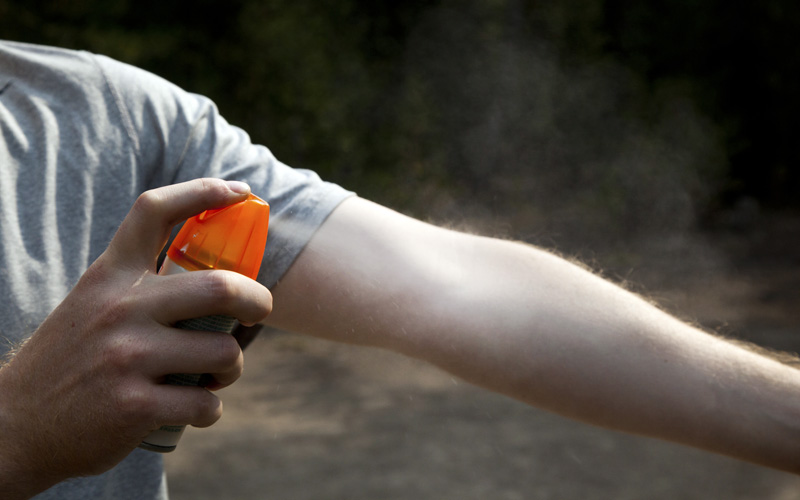
by guest blogger Ava Anderson, natural-beauty expert and safe-cosmetics advocate
Did you know that what we put on our skin can be absorbed directly into our bodies? Our skin is often a gateway to the bloodstream, which is why products like nicotine and estrogen patches work. Unfortunately, our skin lacks the benefit of the body’s digestive detoxification systems, which include saliva and the liver.
This is why we have to be especially careful with what we put on our skin!
It’s particularly important to think about skin absorption in the summer months, when we use products like sunscreen and bug spray more frequently, applying them to our skin to keep us safe from the sun. They often include harmful chemicals. One surefire way to stay safe from both bugs and toxins? Know your ingredients!
Here’s what you do and don’t want in your next spritz of bug spray:
DON’T: N,N-diethyl-meta-toluamide, aka DEET. Invented in the 1950s, DEET is effective at keeping bugs at bay and is the most common ingredient used in insect repellents today. However, DEET has been linked to a number of health issues, including death (from ingestion), asthma, seizures, insomnia, impaired cognitive function, and nervous system damage.
DO: Organic catnip essential oil. Catnip is a common garden plant that’s an effective mosquito repellent. In tests, Chris Peterson, PhD, and Joel Coats, PhD, chairs of Iowa State’s entomology department, even found it to be more effective than DEET!
DON’T: Fragrance/parfum. In the U.S., manufacturers can legally hide dozens of synthetic chemicals in the one word—”fragrance”—without revealing what those ingredients are. It’s referred to as a “trade secret” in the industry, but it is actually a loophole big enough to drive a truck though. Environmental Working Group researchers found more than 75 percent of products listing the ingredient “fragrance” contained phthalates (THAL-ates) which have been linked to disrupted hormonal activity, fertility problems, and reproductive malformation, along with liver and breast cancer, diabetes, and obesity.
DO: Organic lemon eucalyptus essential oil. Oil from Australia’s lemon eucalyptus tree is an effective mosquito repellent, as well as a deterrent of horseflies, gnats, and ticks. There’s evidence that components in the oil are as effective as DEET, and in some cases, even more effective. It has a strong scent that’s believed to confuse mosquitoes’ delicate sense of direction and taste, making it difficult for them to find a host. In 2000, the Environmental Protection Agency registered oil of lemon eucalyptus as an effective “biopesticide repellent”—meaning that it’s derived from natural plant materials.
DON’T: Propellants. Propane, butane, isobutane, hydrofluorocarbons, and dimethyl ether are the most common propellants used in bug sprays. Headaches, breathing difficulties, mood swings, and nausea are just some of the acute symptoms of these harmful chemicals.
DO: Organic peppermint essential oil. Flies and ants don’t like the scent of peppermint, making this essential oil an effective natural insect repellent. You can also grow peppermint plants in your garden to keep mosquitos away without toxic chemicals!
Have a happy, safe, and bug bite-free summer!
 At the age of 15, Ava Anderson launched her safe line of personal care and home-cleaning products, Ava Anderson Non Toxic. Now in college, Ava is educating hundreds of thousands of American families annually on the issue of toxic chemicals in products through her line, which now includes baby, skin, hair, body, cosmetics, men’s, candles, bug, home, sun, and pet products. An undergrad at Babson College in Wellesley, Massachusetts, Ava actively helps run her large company with over 90 employees and thousands of Ava Consultants in every state in the nation. Her goal is to force a paradigm shift on the issue of toxic chemicals in products—with your help.
At the age of 15, Ava Anderson launched her safe line of personal care and home-cleaning products, Ava Anderson Non Toxic. Now in college, Ava is educating hundreds of thousands of American families annually on the issue of toxic chemicals in products through her line, which now includes baby, skin, hair, body, cosmetics, men’s, candles, bug, home, sun, and pet products. An undergrad at Babson College in Wellesley, Massachusetts, Ava actively helps run her large company with over 90 employees and thousands of Ava Consultants in every state in the nation. Her goal is to force a paradigm shift on the issue of toxic chemicals in products—with your help.




Once again, Thank You, for reminding us of the dangers we need to avoid. It’s easy to forget how terrible these products are in the busy rush of daily life. I am going to keep this email so I can go back to it and remind myself of what products to avoid. Thanks, Ava.
The Ava Anderson Non Toxic Bug Spray works beautifully on the noseeums in Florida! Before we found this, my son’s legs were covered in red sores.. between the avaBUG spray and the avaBODY Dream Cream.. his legs and mine are clear!!! Amazing safe! non toxic! reliable! Thanks!
Thanks Ava for sharing so many helpful facts about Bug Spray. My family and I used the avaBUG Spray in the Berkshire Mountains over the July 4th weekend and I’m happy to report none of us had one bug bite!!
There are so many toxic chemicals in conventional Bug Spray!!! Thanks Ava for the great reminder of what to avoid and what to look for!
THANK YOU! Such important information with the diseases spread by ticks and mosquitoes. I hate choosing between possible disease infection an harmful chemicals on my family- good to know I don’t have to!!!
Great Information!
Thank you Ava for providing a natural alternative repellent for ticks, gnats, flies and mosquitoes! LOVE all your products!
Great information to share with friends! We use and love the Ava Anderson bug spray. It has saved us many times!
Great information! Thank you! Appreciate the facts in a great, simple “do” and “don’t” format!
The “Do’s” are definitely a safe list of ingredients for bug spray that I feel confident putting on my skin and the skin of my loved ones. Great information!
I love learning about how to make safe choices… that work BETTER than what I used to use! Thank you for empowering us to know how to read our product labels. Hearing Ava’s message has been life changing… after years of infertility, we are waiting on the arrival of our first child at the age of 38! We can’t fully understand how these harmful chemicals are affecting our health until we make the switch!